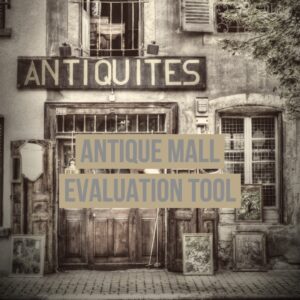There are SO many important considerations when choosing an antique mall that it was very hard for me to narrow it down to a “top ten.” Choose wisely now, and some day you will be very glad that you did! Make sure you get the free Antique Mall Evaluation Tool at the end of this post!
1. Customer Traffic
A significant advantage of an antique mall over a stand-alone shop is customer traffic. As you consider an antique mall location, look around for customers, lines at the checkout counter, cars in the parking lot, shoppers within each antique booth. Talk to mall employees and other dealers to learn more about their customer count and expected volume. Obviously, the more customers you have, the more opportunities you have to sell, sell, SELL!
2. Location, Location, Location
The best locations for antique malls are those that are near a highway or well-travelled route, in a historic district, or near a tourist attraction. These locations are best because they attract a steady stream of new customers and out-of-town money.
Of course, you also have to consider your commute distance and time. Additionally, you need to consider whether the mall is near your ideal customer- the ones your items will appeal most to. This applies specifically if you are an artist or craftsman who sells specialized, custom pieces that attract a certain clientele.
3. Mall Staff
WOW- I cannot stress this point enough. Mall employees are essentially YOUR employees and salespeople. Customer service is a key differentiator in any retail business, and it will absolutely make or break your business. When you have friendly, smiling, helpful retail associates, you have a huge advantage.
They will take great care of your customers- and your customers will keep coming back. The opposite is also glaringly apparent- poor customer service almost always guarantees failure. This is why mall staff should be a key consideration when choosing your location. If you are choosing between two otherwise similar locations, choose the one with the friendliest employees. All. Day. Long.
Mall employees are essentially YOUR employees and salespeople.
4. Reputation
Your mall comes with a built-in reputation. Just like choosing a best friend or a lover- you should wisely choose the antique mall that will be your business partner. You can learn a lot by reading online reviews from customers. Yelp, FaceBook, and Google can provide you with valuable insights about your antique mall. Give heed to customer opinions and do your own due diligence to research an antique mall. Knowledge is power.
5. Mall Policies and Restrictions
Each antique mall operates a little differently, based on ownership and management. Here are a few variables to be aware of:
- Restrictions on merchandise (must be a true antique, must specialize in type of item, etc.)
- Policies regarding discounts and sales
- Expectations for dealers to work a number of hours on-site
- Guidelines regarding when dealers can tend to their antique booths (during or outside of business hours)
- Loading and unloading practices (back-door only, loading dock, etc.)
- Tools available for dealer-use such as dollies, carts, ladders, vacuums, or brooms
Depending on your business, some of these factors may hurt or help you, so be sure you understand them before signing a lease.
6. Hours of Operation
Your sales are limited to the antique mall hours of operation- the more hours your booth is open, the more opportunities you have to make sales. There are plenty of antique malls that close at 5pm every evening. Think about all of the people who work during the day and have little or no opportunity to shop there! If possible, find a mall with extended hours of operation. Your sales will thank you.
The more hours your booth is open, the more opportunities you have to make sales.
7. Rent and Fees
Antique malls vary regarding contracts, rent prices, and additional fees. Some contracts go month-to-month. Others require commitments of 3-6 months. Some require 30 days notice (or more) to move out. Many have a waiting list to move in.
On average, a typical antique mall charges a monthly fee of $2-$4 per square foot of rental space. This is based upon a variety of factors, including the local real estate market prices and the building’s amenities and offerings. Typically, malls will also charge additional fees for commission, credit card processing, advertising, etc. Ask questions and learn as much as you can in order to compare malls and make the best possible choice.
8. Curb Appeal
Appearance matters in the antique booth business. Our customers like nice things- things to beautify their homes or personal spaces- so they may hesitate to shop in a place that does not hold visual appeal. The “Pottery Barns” of the world understand the importance of a location that looks beautiful both outside and in.
I’m not saying to choose a location solely based upon it’s outer beauty, but think long and hard before you choose a place that is unkept, uncared for, or outright neglected on the outside. You want your customers to be proud to shop at your mall!
Appearance matters in the antique booth business.
9. Parking
Your sales depend on customer traffic- and most customers need a place to park. Here are a few questions to help you evaluate an antique mall’s parking situation:
- Is there adequate and safe parking- for customers and for dealers- at or around the antique mall?
- Is the parking lot well maintained, with clearly marked parking spaces?
- Is there a separate place for employee/dealer parking? If your parking lot is full of dealers who are tending to their booths, where will your customers park?
- Is there a separate area for loading/unloading large pieces and bulky furniture?
- Is there an area nearby for overflow parking?
- Is there free parking in and around the area?
10. Theft Prevention
Theft is always a risk in any kind of retail business, and it hurts your sales and profitability. Choosing the right location can significantly affect the amount of shoplifting you experience. Here are a couple of ways to determine an antique mall’s level of theft:
- Ask some of the dealers and employees about their experience with shoplifting.
- Look around the mall for evidence that indicates theft-prevention measures such as items locked in cases, security cameras, shoplifting signs, and bars on windows and doors.
- Shop other stores nearby to gauge the use of anti-theft devices, such as security gates, tags, etc.
- Notice the police or security guard presence at or around the mall.
Talk to your mall about their theft- prevention measures and what, if anything, is done to reimburse dealers for stolen items. Find out more about their policies for identifying and prosecuting shoplifters.
As you can see, there are many more considerations for choosing an antique mall and making the right choice is essential to the success of your business. With these tips and some thoughtful research, you will find the right mall for your antique booth. If you are looking for an antique mall right now, get my free Antique Mall Evaluation Tool below.

Don't make the mistake of picking the wrong antique mall!
Get the Free Antique Mall Evaluation Tool to help you choose the right mall for your antique booth business.

